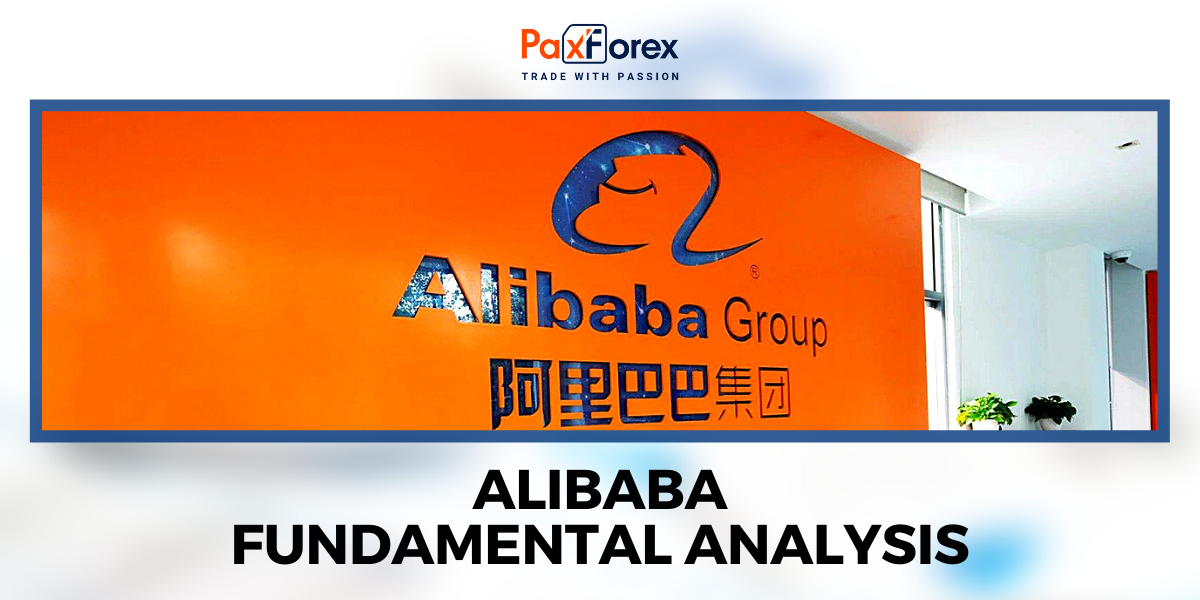
Source: PaxForex Premium Analytics Portal, Fundamental Insight
Down more than 20% for the year, Chinese tech giant Alibaba Group has been unable to avoid the consequences of a bear market in 2022. Like many e-commerce companies, the company faces global macroeconomic challenges, such as inflation and a possible recession. But China-specific disadvantages are also another big challenge.
Let's take a look at these factors and what they could mean for the company's prospects in the year ahead.
Founded 23 years ago, Alibaba is the undisputed leader in Chinese e-commerce, with a 47% market share. But it's not just online sales; the company also has a portfolio business, which includes cloud computing, traditional retailing, and logistics. Alibaba's size gives it a strong economic advantage over its competitors through economies of scale and the "network effect," which is when a platform gains value as more people use it.
The company's stock price historically reflects its business success - it has risen 366% since its initial public offering at $68 a share in 2014 to an all-time high of $317 six years later. But after a strong performance in the early stages of the pandemic, slowing revenue growth and regulatory uncertainty were serious red flags for investors.
Alibaba's Q3 earnings underscore the severity of the company's problems. The company's revenue rose just 3% YoY to $29.1 billion, a sharp slowdown from the 29% growth in the previous year. According to company executives, this weakness is partly due to strict quarantine restrictions in China, which is negatively affecting consumption. But that story may not be entirely true.
For the past three years, China has had strict quarantine restrictions because of the coronavirus, which have not prevented the company from posting double-digit growth rates during most of those periods. Moreover, many believe that these restrictions have contributed to shopping growth in 2020 and 2021.
Alibaba's more fundamental problem may not be a quarantine, but stagnation and business maturity. And while China is finally going to relax some of the strictest aspects of the lockdown, these changes probably won't bring Alibaba back to its previous growth rate.
The BBC reports that the company may be dealing with increasing competition and regulatory measures from the Chinese government. Alibaba was fined $2.8 billion in 2021 for violating antitrust laws by not allowing sellers to sell on other platforms. Increased scrutiny could force management to be more cautious about the tactics they use to expand their business.
Additional long-term concerns include U.S. trade restrictions on exports of advanced semiconductor chips to China. Semiconductors help power data centers, artificial intelligence, and other technologies. An export ban could hurt Alibaba's efforts to remain competitive in cloud computing. Revenue in the company's cloud services segment rose 4 percent to 20,757 yuan ($2.98 billion), about 10 percent of total revenue.
With a price-to-earnings ratio of 12, Alibaba trades at a significant discount to the average S&P 500 ratio of 20. But that doesn't necessarily make its stock a great investment option. Regulatory uncertainty in China is a big problem for long-term investors. And the company's slowing earnings growth could end up stagnating earnings if things don't improve.
As long as the price is above 81.00 follow the recommendations below:
- Time frame: D1
- Recommendation: long position
- Entry point: 91.28
- Take Profit 1: 95.00
- Take Profit 2: 104.00
Alternative scenario:
If the level of 81.00 is broken-down, follow the recommendations below:
- Time frame: D1
- Recommendation: short position
- Entry point: 81.00
- Take Profit 1: 76.00
- Take Profit 2: 71.00













